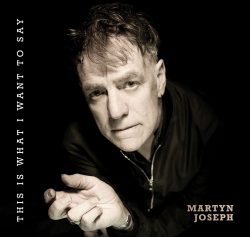Martyn Joseph gathers the world in a giant bear hug, advising listeners how to power through despair and heal everything with radical love.
 Penarth, Wales’s Martyn Joseph has been called “The Welsh Springsteen,” but it’s hard to picture The Boss alone on a stage without his enormous band alongside him. On ‘This Is What I Want To Say’ singer-songwriter Joseph – backed with only acoustic guitar, piano, or organ – is the focal point of every song, with all other instruments outside that spotlight and far in the background. Joseph explores emotional depth on this album with a sometimes painful look at weakness, aging, and the fragility of human nature. He is not breaking new ground, but his takes on life and current events are still worth hearing. At 60, with a forty-year career behind him, his personal history is interwoven with political history and collective memory, so he inevitably brings up climate change, immigration, and conservation.
Penarth, Wales’s Martyn Joseph has been called “The Welsh Springsteen,” but it’s hard to picture The Boss alone on a stage without his enormous band alongside him. On ‘This Is What I Want To Say’ singer-songwriter Joseph – backed with only acoustic guitar, piano, or organ – is the focal point of every song, with all other instruments outside that spotlight and far in the background. Joseph explores emotional depth on this album with a sometimes painful look at weakness, aging, and the fragility of human nature. He is not breaking new ground, but his takes on life and current events are still worth hearing. At 60, with a forty-year career behind him, his personal history is interwoven with political history and collective memory, so he inevitably brings up climate change, immigration, and conservation.
The opening song ‘Folding’ deals with goodbyes, loss, aging, loss of faith, and summoning the courage to face harsh reality. He puts into words what others of his generation feel, a mix of despair, rage, and hope. The gray and misty ‘Pacific Northwest’ finds Joseph feeling a kinship with the beauty and wet weather of that part of North America, the spot of all places on the continent where the rainfall most closely resembles that of Wales. I don’t mean to suggest that there is a Jungian symbolic meaning of rain in the lyrics, but it does pop up a lot on the album. The sun peeks out from the clouds by the hopeful chorus: “We are the hope / We are the ones / and we stand in the light of a thousand suns.”
‘Albert’s Place’ is about a real, volunteer-run food bank and soup kitchen in Sunderland, with the charity’s warm story backed by melodic acoustic fingerpicking. The song was commissioned by the BBC for a modern folk series. Joseph’s solidarity with society’s most vulnerable is also shown on ‘Waiting For The Rain,’ about Syrian refugees immigrating to Wales. He displays a touching faith in cultural diversity overcoming all societal conflicts and problems. On ‘Grateful’ he seeks out the good in the world, whether nature, art, the sacred, or life-saving modern technology. ‘Don’t Need No Cathedral’ is something people of a pantheistic eco-warrior bent often say. For Joseph, everything is interconnected, and the sacred is found in wild places like an old-growth forest, a starry sky, or the sea — or love. ‘I’d Take You Out’ is the one angry exception to Joseph’s determination to love everyone. Addressing a murderous unnamed tyrant whom he wants to mercilessly lynch, he is willing to lose his soul to rid the world of this evil, growling, “I’d lose my soul / But I’d take you out.”
‘This Is What I Want To Say’ is full of optimistic, altruistic, and encouraging messages put to sad, thoughtful, and intricately played acoustic music. There are love songs to his wife and family, including what sounds like a wedding blessing (‘It’s A Fine Thing’), but others are bits of wisdom for everyone listening. As Joseph is well aware, there’s so much in life we can’t control, yet he reminds us all to try to do good and remain grateful for what we have. In many ways, the album continues the theme of his song ‘Here Come The Young.’ He urges young people, including his youngest child and grandchild, to continue his quest to make the world a better, more welcoming place. He gives them this task with total confidence that they will succeed.



This stripped down recordings are exactly the reason why I don‘t buy MJ-Records anymore.
It lacks everything what mades a good album. Still reminds me of his 90ths CDs with a full backing band. Great …